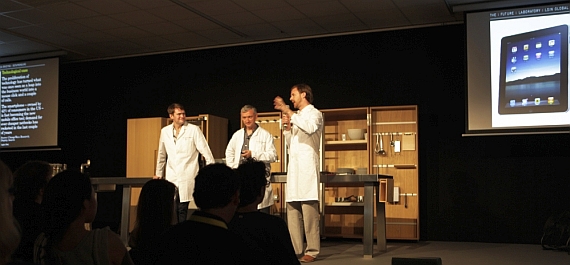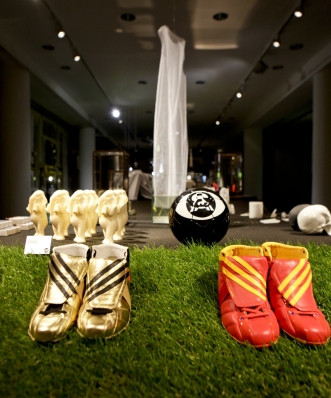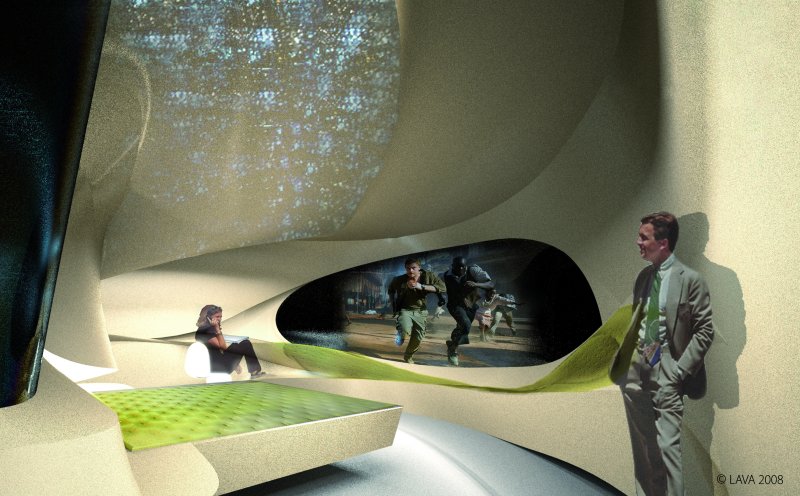Design Hotels' forum: Futurologists predicting wild years till 2020
 |
|
| Three explaining the future: Chris Sanderson, Martin Raymond, and James Wallman (from left) from The Future Laboratory London. |
Berlin (June 18, 2010). The years till 2020 will be as wild as teenage years. Therefore, trend researchers of the "Future Laboratory" in London are already talking about "Turbulent Teens". Last week, during the "Future Forum" of Design Hotels in Berlin, the researchers characterised the society''s future in vivid descriptions and colourful pictures from which the trends of the hotel industry and tourism will also develop. This means, only lateral thinking is in, well-known mechanisms are being turned upside down and everything questioned. Internet and retail are connecting more closely and becoming pioneers at collecting customer desires. Working times and methods will become more flexible and the subject of environment will finally change travel behaviour. The audience listened three hours to a flood of trends.
Design Hotels opened the forum for external guests as well. 300 guests were mesmerized by the analysts of "Hybrid Thinking".
The future always starts now. In 2011, the global oil emission will reach its peak; after that the oil rates will keep increasing. This also influences the travel behaviour massively as flying and driving by car becomes more expensive. Will global meetings continue to take place? Will long-distance destinations become less attractive? Chris Sanderson and Martin Raymond, two founders of the market research business Future Laboratory in London, questioned many current trends with examples from the entire social development and tried to present solutions: one result of this development will be that people will work and eat more often where they live. They will use local resources and think and act in a more environmentally friendly manner.
 |
|
| Creativity will influence the future more than ever. / photos: Design Hotels |
2010 to 2020: The abnormal becomes normal
They are tired of the present: Greek workers protesting on the streets and swearing at the causers of the latest financial crisis are the symbol of collective resistance of the masses. Since 1970, there have been 176 financial crises and 96 bank crises, says Future Laboratory quoting other experts; the number will be doubled by the end of this year. Their prognosis: In the "Turbulent Teens" up to 2020, the abnormal will become normal!
The masses will influence many trends of the turbulent teeny years. The futurologists predict that the middle-class will double in this decade. People are moving from the country to the big cities everywhere: in 2040, nearly 80% of the people will be living in cities. The masses will live close together and on top of one another: high-rise balconies will become pools and between the high-rise buildings a kind of urban agriculture will develop.
Thanks to education, mobility and internet, ideas will be put into realisation around the entire globe for the first time: these types of buildings will be constructed in India as well as in Europe or Brazil, say experts. The keyword locality thus receives an entirely new meaning; the thought of "community" is newly defined. This means for hotels: they have to deal and live with their community, their neighbourhood more intensively. If the neighbours do not know the hotel, it is not being integrated.
A couple in bed with two Blackberries
The people''s awareness for many things will increase: for the environment, the food resources but also for the advantages and disadvantages of the digital world. The trend is called "attention economy". However, this also means: customers are anticipating that websites will be set up in a way that they are able to find what they are looking for instantaneously. Customers no longer want to put up with the web chaos - this is an effect of overload. The chaos already makes users ill today: in the US, the dependency on emails has already been defined an illness. The fear that the flood of emails might contain a negative message causes panic. For many, it is the air they breathe, for others it is the water they have to swim in. Especially symbolic is this image: a couple are lying in bed in the evening - with their two Blackberries. The expert formula is: set priorities, filter, slim down, reduce, clear up, select, connect, leave simple messages and take breaks...
"Thin" and "thick" values
"Attention management" also includes "time management". Here, hotels are able to contribute again, anchor themselves in the memories of their guests by offering experiences - small different moments. Those who have set priorities have deliberately decided for a hotel or event. This is the moment where emotions are part of the game. To establish guest loyalty via emotions is the credo of the future. Therefore, the sensitive thinkers of the Future Laboratory in London distinguish between "thin" und "thick values". The first one describes the short-term, matter-of-fact, and little profitable business, the so-called "bottom line business". "Thick value" means a high emotional value for the customers.
The entire business processes will change significantly, also the approach of new products and ideas. The number of people working free-lance or in creative jobs with flexible working hours and unconventional ways of thinking will increase.
 |
|
| A hotel room of the future. / photo: Fraunhofer Institute |
Right now, products are being created in the physical world and sold via internet; in future this will be the other way round: products created for the web will be available in stores only later on.
Out-of-the-pocket power
The sales power of the future lies in trouser pockets - in the mobile phone with internet connection. The market for m-commerce (mobile commerce) will increase by 28 percent to 40 billion USD globally this year, according to experts. However, watch out: mobile devices will make everything transparent. This can also endanger the brand, say Chris Sanderson and Martin Raymond from the Future Laboratory warningly. They advice all suppliers: be reachable globally, but communicate locally...
The future researchers do not attach great importance to social media, such as Facebook or evaluation engines like TripAdavisor: a TripAdvisor evaluation becomes, among others, old within a few seconds as the next one already appears on-screen. Concerning Facebook, the question arises what would happen if the customers had to pay suddenly? Much more futuristic but also more threatening is the fact that your mobile phone will be able to show you in future:
"In Berlin, within a radius of 2 km, there are ten other roulette players..." or "... in your vicinity there are three people who would like to go shopping with you..." Apparently, most people have a great urge to express themselves to other people. The internet offers innumerable opportunities to contact them online.
The question remains: How will "hybrid thinkers" be able to move in this conflicting field of these turbulent teeny years to come? More information will follow soon. / Maria Puetz-Willems
Nov 3, 2006 Visions on the future of living - design hotel forum in Vienna
To print this article you have to be registered and logged in for newsletter, visitor or subscription.





